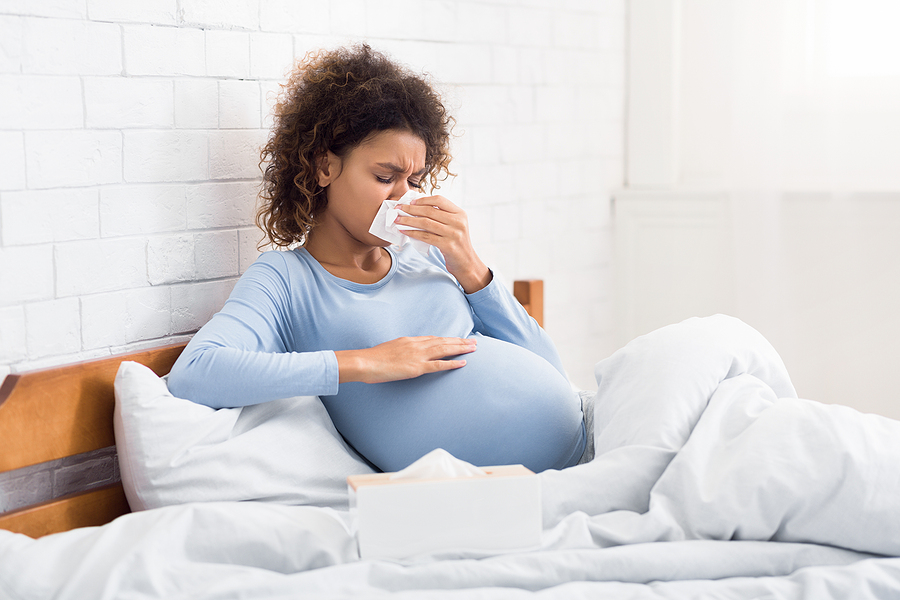Managing Allergies During Pregnancy: Safe Treatment Options for Expecting Mothers
Posted By:SSG Admin Posted On:28-Mar-2025
Pregnancy is an exciting, nerve-wracking time. You’re excited to meet the baby growing inside you, but you’re also anxious. Is the fetus developing correctly? Are you overexerting or not exercising enough? Are you eating the right foods? If you add allergies to that equation, you have the added concern of finding effective and safe treatment options for allergies during pregnancy.
We want you to be able to focus on the excitement of your baby’s first movements. The ultrasounds when you first get a glimpse of your developing child. You don’t have to suffer through the different symptoms. Premium Allergy is here to help alleviate some of the fear expecting moms face when experiencing allergies and finding safe, effective allergy treatments.
How Pregnancy Impacts Your Usual Allergies
With each stage of your pregnancy, your body goes through physiological changes. Your blood flow increases to sustain the life growing within you. This increases mucus production, so you may find you have to blow your nose more.
You may breathe more, while your lung capacity decreases as the fetus grows and pushes into your lungs. Your kidneys work harder to match the increased blood flow.
Hormonal changes also help your body nurture your fetus and prepare for labor and delivery. Even your immune function shifts to protect the two of you. Regulatory T Cells help protect against excessive inflammation. At the same time, those hormonal changes may make you more likely to develop skin allergies.
These changes also impact how allergies affect you. Some women find their usual seasonal or environmental allergies worsen. Others get a reprieve from usual allergy symptoms and enjoy milder symptoms for a change.
Safe Ways to Treat Allergies During Your Pregnancy
Your baby’s safety must come first when you’re finding ways to treat your allergies during pregnancy. Over-the-counter medications are not always the best way to get relief. When considering allergy treatments during pregnancy, the primary concern is fetal safety. It’s essential to consult with an allergist, obstetrician, or other qualified healthcare professional before starting any new medication.
Over-the-counter allergy medications come in several categories. Many doctors consider these options safe during pregnancy, but it’s crucial to ask your doctor as you may have pregnancy complications or medication sensitivities that require you to avoid certain OTC medicines.
First-Generation Antihistamines:
- Chlorpheniramine – Chlor-Trimeton is one of the most popular, but it can cause nausea, dizziness, and drowsiness.
- Diphenhydramine – Best known as Benadryl and is likely to cause drowsiness.
Second-Generation Antihistamines:
- Cetirizine – Best known as Zyrtec, diarrhea, stomach pain, and excessive drowsiness are possible side effects.
- Fexofenadine – Best known as Allegra and arm, back, and leg pain, dizziness, headaches, and vomiting are possible side effects.
- Loratadine – Best known as Claritin and insomnia, stomach pain, headaches, and diarrhea are possible side effects.
Nasal Sprays and Irrigation:
- Corticosteroid Nasal Sprays – Flonase is an example and is safe for pregnancy generally, but again, ask your OB/GYN.
- Nasal Irrigation – Using a neti pot, you fill the sinuses with a warm saline solution to remove excess mucus.
- Saline Nasal Sprays – Saltwater nasal sprays are one of the safest ways to ease nasal congestion during pregnancy.
Immunotherapy:
Immunotherapy is an alternative allergy treatment that involves dissolvable pills placed under the tongue or allergy shots. If you’ve been undergoing immunotherapy before your pregnancy, talk to your doctor to determine if it’s safe to continue. If you do, changing the dosage is not recommended until your baby is born. If any reaction occurs after the usual dosage, a lower dosage is necessary. Otherwise, it’s recommended that you wait until after the pregnancy to start treatment.
Topical Medications:
Skin allergies are usually treated with topical corticosteroids. These are usually okay if they’re low-potency. Again, it’s best to ask your doctor as other options may be just as effective and completely safe for your developing fetus.
Oatmeal baths, as long as the water isn’t too hot, help soothe itchy, irritated skin. Hypoallergenic moisturizers and lotions are also helpful as they hydrate your skin and ease itching. If you can, apply a moisturizer right after getting out of the shower to trap as much water in the skin as you can.
Adjust Your Environment
One of the best ways to ease allergies during pregnancy is by adjusting the environment you’re in. If you know you are allergic to pet dander, have someone keep your pet brushed and washed with a dry shampoo or normal bath to limit the amount of pet dander in the home.
Run an air purifier day and night in the rooms you frequent, such as your bedroom and living room. Have someone sweep, vacuum, and dust for you. While they do, wear a mask to avoid exposure to excessive dust.
If grass and tree pollen are your triggers, keep your windows closed when pollen counts are high. Have someone do the yard work for the remainder of your pregnancy. If you do go outside for a walk, consider wearing a mask to reduce your exposure to those allergens.
Food allergies are important. You don’t want to risk your safety. Stick to foods you prepare to avoid cross-contamination. Avoid takeout for now unless you are certain the restaurant takes extra precautions to prevent cross-contamination.
Stick to a Healthy Diet
Cravings are tough to manage when you’re pregnant. Make sure you’re eating a diet rich in foods that help boost the immune system and reduce inflammation. Leafy greens, berries, tomatoes, ginger, and turmeric are some of the best options, but there are many more.
You also want to drink plenty of water. The more water you drink, the more fluid your mucus. That helps make it easier to keep your sinus passages drained.
When Should You Seek Urgent Medical Care?
Always keep your OB/GYN updated with any allergy symptoms you’re experiencing. Your OB/GYN knows what medications are safe to take at your stage of pregnancy and with your health history.
If your symptoms become severe, be ready to seek urgent medical care. Both your health and your baby’s health are important. If you experience asthma, seek immediate medical care. Also, get immediate care if you:
- Become dizzy.
- Develop hives.
- Experience swelling in the lips, mouth, or tongue.
- Find it difficult to breathe.
- Have chest tightness.
We recommend you ask your OB/GYN for a referral to see the team at Premium Allergy. Not only do we offer online appointment scheduling, but doctors can refer patients to us online, too. We’ll work with you and your doctor to ensure your baby is safe while also making sure you’re comfortable and not dragged down by your allergies.
Our doctor has over a decade of experience helping people of all ages manage their allergies and alleviate symptoms to ensure their quality of life and health don’t worsen. We have effective solutions that help ease your allergies during the remainder of your pregnancy.




